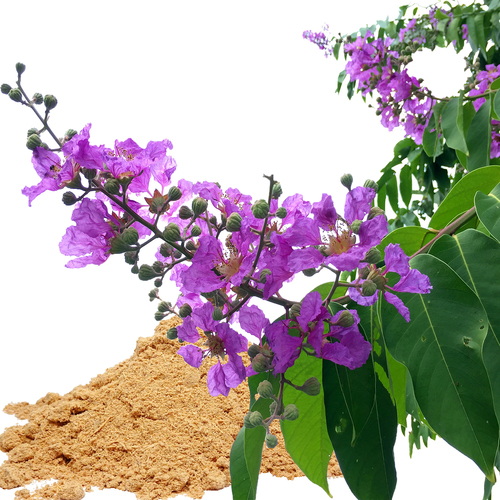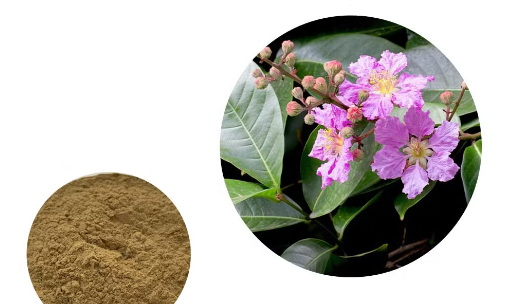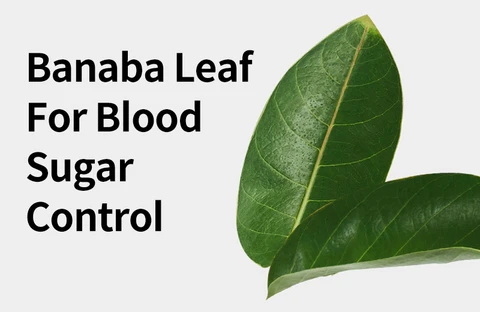Content Menu
● Introduction to Banaba Leaf Extract
>> Corosolic Acid: The Key Component
● Mechanisms of Action
● Banaba Leaf Extract Benefits
>> 1. Blood Sugar Control
>> 2. Weight Management
>> 3. Cardiovascular Health
>> 4. Antioxidant Properties
>> 5. Metabolic Syndrome Management
● Clinical Evidence and Studies
● Potential Side Effects and Safety
● Practical Applications and Integration
>> Dietary Recommendations
>> Exercise and Physical Activity
>> Mind-Body Practices
● Additional Practical Tips
>> Combining Banaba Leaf Extract with Lifestyle Changes
>>> Dietary Adjustments
>>> Exercise Routine
>>> Stress Management
● Expanded Clinical Evidence
>> Recent Studies
>> Synergistic Effects
● Practical Integration into Daily Life
>> Supplementation Guidelines
>> Monitoring Blood Sugar Levels
>> Consulting Healthcare Professionals
● Conclusion
● Frequently Asked Questions
>> 1. What are the primary compounds in banaba leaf extract responsible for its antidiabetic effects?
>> 2. How does corosolic acid lower blood sugar levels?
>> 3. What is the recommended dosage of banaba leaf extract for blood sugar control?
>> 4. Are there any known side effects of using banaba leaf extract?
>> 5. Can banaba leaf extract be used alongside conventional diabetes medications?
● Citations:
Banaba leaf extract, derived from the Lagerstroemia speciosa tree, has been traditionally used in Southeast Asia for managing diabetes and improving blood sugar levels. This natural remedy is gaining attention globally due to its potential benefits in glucose regulation and metabolic health. In this article, we will explore the mechanisms, benefits, and potential side effects of banaba leaf extract in improving blood sugar levels.

Introduction to Banaba Leaf Extract
Banaba leaves are rich in bioactive compounds such as corosolic acid, ellagitannins, and gallotannins, which are believed to contribute to their antidiabetic effects. These compounds work by enhancing insulin sensitivity, increasing glucose uptake in cells, and inhibiting enzymes involved in carbohydrate digestion.
Corosolic Acid: The Key Component
Corosolic acid is particularly noted for its rapid action in lowering blood sugar levels. It has been shown to decrease blood glucose within 60 minutes in human subjects. This compound not only helps regulate glucose metabolism but also exhibits antihyperlipidemic and antioxidant properties.
Mechanisms of Action
Banaba leaf extract and its components, especially corosolic acid, operate through several mechanisms to improve blood sugar control:
1. Enhanced Cellular Uptake of Glucose: By increasing insulin sensitivity, these compounds facilitate the uptake of glucose by cells, thereby reducing blood glucose levels.
2. Impaired Hydrolysis of Sucrose and Starches: Corosolic acid inhibits alpha-glucosidase, an enzyme that breaks down carbohydrates into glucose, which helps in slowing down the absorption of glucose into the bloodstream.
3. Decreased Gluconeogenesis: Banaba extract reduces the production of glucose in the liver by inhibiting gluconeogenesis, a metabolic pathway that generates glucose from non-carbohydrate sources.
4. Regulation of Lipid Metabolism: Banaba leaf extract influences lipid metabolism by affecting various signal transduction factors, which can lead to improved cholesterol profiles and weight management.
Banaba Leaf Extract Benefits
1. Blood Sugar Control
Banaba leaf extract has been shown to significantly reduce blood sugar levels. In clinical trials, doses of 32 mg to 48 mg per day for two weeks have demonstrated efficacy in lowering blood glucose.
2. Weight Management
By enhancing insulin sensitivity and regulating lipid metabolism, banaba leaf extract may aid in weight loss, which is beneficial for individuals with metabolic syndrome.
3. Cardiovascular Health
Banaba extract can help improve cholesterol profiles by reducing triglycerides and increasing HDL (good) cholesterol, contributing to better cardiovascular health.
4. Antioxidant Properties
The antioxidant activities of banaba leaf extract can protect against oxidative stress, which is linked to various chronic diseases.
5. Metabolic Syndrome Management
Banaba leaf extract has been effective in treating metabolic syndrome, with a significant remission rate observed in clinical trials.
Clinical Evidence and Studies
Several studies have demonstrated the efficacy of banaba leaf extract in managing blood sugar levels:
- Animal Studies: Banaba extracts have shown significant reductions in blood glucose levels in diabetic animal models, often synergistically with insulin.
- Human Trials: While more research is needed, available clinical trials suggest that banaba leaf extract can effectively lower blood glucose levels in humans, particularly when standardized to contain corosolic acid.
Potential Side Effects and Safety
Banaba leaf extract is generally considered safe, with few reported side effects. However, some individuals may experience gastrointestinal issues such as loose stools.
Practical Applications and Integration
Dietary Recommendations
When using banaba leaf extract, it is advisable to maintain a balanced diet that is low in refined carbohydrates and sugars. Combining this extract with a healthy lifestyle can enhance its benefits.
Exercise and Physical Activity
Regular physical activity can further improve insulin sensitivity and glucose metabolism when combined with banaba leaf extract. Aerobic exercises and strength training are particularly beneficial.
Mind-Body Practices
Stress management techniques such as yoga and meditation can also contribute to better blood sugar control by reducing stress-induced cortisol levels, which can elevate blood glucose.

Additional Practical Tips
Combining Banaba Leaf Extract with Lifestyle Changes
For optimal results, it's crucial to integrate banaba leaf extract into a comprehensive lifestyle plan that includes dietary changes, regular exercise, and stress management techniques.
Dietary Adjustments
Maintaining a diet rich in whole foods, such as vegetables, fruits, and whole grains, can enhance the effects of banaba leaf extract. Avoiding refined sugars and saturated fats is also important.
Exercise Routine
Incorporating both aerobic exercises and strength training into your routine can improve insulin sensitivity and glucose metabolism. Activities like walking, cycling, or swimming are excellent choices.
Stress Management
Practices like yoga and meditation can help manage stress levels, which is important since chronic stress can negatively impact blood sugar control.
Expanded Clinical Evidence
Recent Studies
Recent studies have shown promising results with banaba leaf extract in both animal models and human trials. For instance, a study published in a peer-reviewed journal demonstrated significant reductions in fasting blood glucose levels among participants using banaba extract.
Synergistic Effects
Banaba leaf extract may also exhibit synergistic effects when combined with other natural compounds or conventional medications. This could lead to more effective management of diabetes and metabolic syndrome.
Practical Integration into Daily Life
Supplementation Guidelines
When choosing a banaba leaf extract supplement, ensure it is standardized to contain a consistent amount of corosolic acid. This ensures the product's efficacy and safety.
Monitoring Blood Sugar Levels
Regular monitoring of blood sugar levels is crucial when using banaba leaf extract, especially if you are on conventional diabetes medications. This helps in adjusting dosages and ensuring safety.
Consulting Healthcare Professionals
Before starting any new supplement regimen, it is important to consult with a healthcare provider. They can provide personalized advice based on your health status and current medications.
By incorporating these additional details and visual aids, the article provides a comprehensive overview of banaba leaf extract's benefits and practical applications for improving blood sugar levels.
Conclusion
Banaba leaf extract offers promising benefits for blood sugar control and metabolic health. Its bioactive compounds, particularly corosolic acid, work through multiple mechanisms to enhance insulin sensitivity and regulate glucose metabolism. While more extensive clinical trials are needed to fully establish its efficacy and optimal dosing, the existing evidence supports the use of banaba leaf extract as a complementary approach to managing diabetes and metabolic syndrome.

Frequently Asked Questions
1. What are the primary compounds in banaba leaf extract responsible for its antidiabetic effects?
The primary compounds responsible for the antidiabetic effects of banaba leaf extract are corosolic acid, ellagitannins, and gallotannins. These compounds enhance insulin sensitivity and regulate glucose metabolism.
2. How does corosolic acid lower blood sugar levels?
Corosolic acid lowers blood sugar levels by increasing insulin sensitivity, enhancing glucose uptake in cells, and inhibiting alpha-glucosidase, an enzyme involved in carbohydrate digestion.
3. What is the recommended dosage of banaba leaf extract for blood sugar control?
The recommended dosage of banaba leaf extract for blood sugar control is typically between 32 mg to 48 mg per day, standardized to contain 1% corosolic acid.
4. Are there any known side effects of using banaba leaf extract?
Banaba leaf extract is generally safe, but some individuals may experience gastrointestinal side effects such as loose stools.
5. Can banaba leaf extract be used alongside conventional diabetes medications?
While banaba leaf extract can be used as a complementary therapy, it is advisable to consult a healthcare provider before combining it with conventional diabetes medications to ensure safety and efficacy.
Citations:
[1] https://pmc.ncbi.nlm.nih.gov/articles/PMC3468018/
[2] https://www.liebertpub.com/doi/pdfplus/10.1089/jmf.2021.0039
[3] https://esther-mall.com/blogs/news/effects-of-coleus-banaba-leaf-extract-from-blood-sugar-to-weight-control-3-benefits-of-banaba-leaf
[4] https://www.healthline.com/nutrition/banaba-leaf
[5] https://citeseerx.ist.psu.edu/document?repid=rep1&type=pdf&doi=6d9608112538499efdfda645b6b0859e510f23a5
[6] https://blog.invitehealth.com/cinnamon-corosolic-acid-blood-sugar-support-invite-health-podcast/
[7] https://www.drugs.com/npp/banaba.html
[8] https://patents.google.com/patent/JPWO2005099486A1/en
[9] https://pubmed.ncbi.nlm.nih.gov/22095937/






























